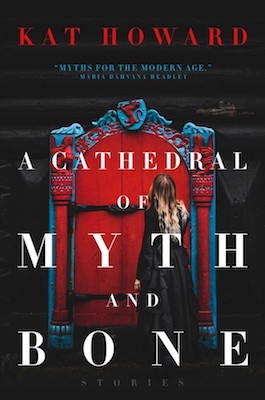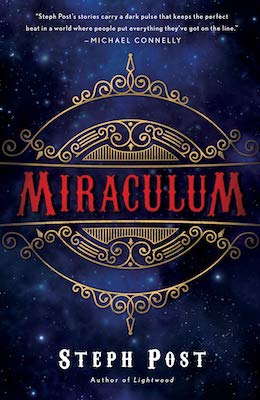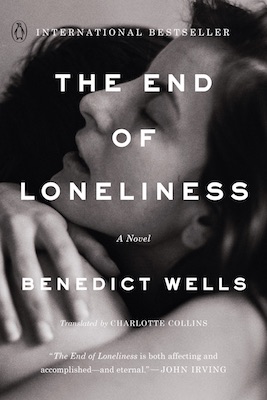Every month, the Writer’s Bone crew reviews or previews books we've read or want to read. This series may or may not also serve as a confessional for guilty pleasures and hipster novels only the brave would attempt. Feel free to share your own suggestions in the comments section or tweet us @WritersBone.
No Sunscreen for the Dead by Tim Dorsey
Daniel Ford: *holds fingers over his eyes* Oh god, what is Serge doing now. Just kidding, I’m in on every thrill ride Tim Dorsey wants to send me on.
The Paragon Hotel by Lyndsay Faye
Daniel: I had an absolute blast reading The Paragon Hotel, as I do all of Lyndsay Faye’s fiction, going back to The Fatal Flame. I adored Jane Steele, but there was something about this book that got under my skin even more. It starts off with a bang, almost quite literally. We meet Alice “Nobody” James on a train headed west as she’s nursing a couple of bullet wounds. She ends up at the Paragon Hotel and is taken care of by the hotel’s eclectic gathering of staff and residents, each with their own secrets. Alice is one of those characters that’s both incredible independent and strong, but also vulnerable and insecure. And she’s got this wonderful sense of humor that acts like a defense mechanism at times. Faye ups the ante by giving Alice a supporting cast that is just out-of-this-world good and tackles timely themes that should remind readers how far we’ve come (and where we’ve fallen woefully short). Faye is currently working on a reimagining of William Shakespeare’s Hamlet (an act she says requires “pretty big trousers”) where the main character is more snarky than whiny. Count us in!
A Cathedral of Myth and Bone: Stories by Kat Howard
Daniel: Yes, I believe this will keep us occupied while we wait for Kat Howard’s next novel. Bonus points for a dynamite opening line in her introduction: “Writing, for me, is an act of faith.”
Congratulations, Who Are You Again? by Harrison Scott Key
Gary Almeter: This is a very funny book about a man who has dream. More specifically, it’s a book by and about a man who writes a book. And it's very funny. Not that having a dream is funny. But it sort of is when you think about the absurdity of dreams and the itty-bitty likelihood that they will ever be realized. Harrison wends his way through college, grad school, and various jobs and various incarnations—son, husband, father, fundraiser, teacher—on his way towards becoming an author. As he does so, you’ll laugh and be inspired. You’ll admire his tenacity and you might even begrudge his success. His authenticity is rare and he’s someone who—despite the odds—never ever ever lets go of his dream.
The Golden State by Lydia Kiesling
Taylor Krajewski: Lydia Kiesling’s The Golden State is essentially a 10-day epic sketch of the narrator's mental breakdown, which coincides with a rogue group of activists trying to split away from California and create the State of Jefferson. The book is, of course, so much more than that, but after two chapters, I was hooked. The author also uses minimal punctuation, which really helps to highlight the first-person narrator’s descent into insanity.
Sugar Run by Mesha Maren
Daniel: Sugar Run came highly recommended by our literary pal David Joy and the book exceeded even our lofty expectations. Jodi McCarty, recently freed from a lifetime prison sentence when we meet her in the beginning, is a phenomenal character, one that I loved even when she was doing things detrimental to herself and others. There is plenty of sentence-level beauty in this debut.
My Year of Rest and Relaxation by Ottessa Moshfegh
Daniel: Speaking of beautiful sentences, how great is author Ottessa Moshfegh? Her novel My Year of Rest and Relaxation likely would have made my top 50 list had I gotten a few more hours in 2018 (and really, who wanted that?). More inspired prose from The Man Booker Prize nominee.
Convenience Store Woman by Sayaka Murata, translated by Ginny Tapley Takemori
Anna Kramer: Single and childless at age 36, working at the same part-time job for 15 years, the eccentric Keiko is considered a loser and a misfit by the standards of Japanese society. Yet her seemingly menial job as a Tokyo convenience store clerk gives her life its purpose and meaning. Will she be able to remain in the world she’s carefully built for herself, or will she succumb to the relentless pressure to fit in? That’s the dilemma at the center of Sayaka Murata’s thought-provoking novel Convenience Store Woman. Narrated in Keiko’s disarming first-person voice, this is a short, quick read with a lot going on beneath its breezy surface. You’ll be left questioning your assumptions about work, conformity, and identity—and you may never see the person across the convenience store counter the same way again.
Hong Kong Noir, edited by Jason Y. Ng and Susan Blumberg-Kason
Daniel: Damn you, Spencer Wise, for once again draining my book budget (heh, budget, ooookay). This is a terrific short story collection from Akashic Books’ ongoing series. These fourteen stories will warm your noir-loving heart and give you a glimpse into one of the world’s greatest cities.
We Were the Mulvaneys by Joyce Carol Oates
Rebecca Weston: We Were the Mulvaneys by Joyce Carol Oates is a novel about a family living on a farm in New York state. Michael Sr. and Corinne are still madly in love after nearly two decades of marriage and four children. Michael Jr. and Marianne are good looking and popular. Patrick is extremely bright and determined. Judd, the youngest, is our narrator. The Mulvaneys are so effortlessly beautiful and talented and well-liked, they seem almost to glow. Then, the unthinkable happens. And, not all at once, but, slowly, painfully, the family begins to break apart, and the good slips farther and farther away. I am always stunned by the power of Oates’s writing. Here, her ability to draw such complex characters and such a deep family history made me forget that I wasn’t a part of it. Then again, maybe we all are. As in her famous short story, “Where Are You Going, Where Have You Been?” Oates manages to draw a jagged nail through a safe, beautiful landscape and turn everything in its path to rust. But in We Were the Mulvaneys, there is hope in the after.
The Library Book by Susan Orlean
Rebecca: Susan Orlean, author of The Orchid Thief, believes that books have souls. Her newest work of nonfiction sure does. The Library Book is about libraries, in particular the main branch of the Los Angeles Public Library. From Orlean’s descriptions of brave and beautiful librarians, to her musings on whether or not the compulsive liar Harry Peak started the 1986 fire that consumed hundreds of thousands of books, to her imagery of the white-hot fire itself, Orlean pulls us into the enchanting, at times comforting, at times uncomfortable, almost magical world of the library, “a place that is home when you aren’t at home.” This is a must-read for anyone who has ever held a book and felt understood by it.
Tear It Down by Nick Petrie
Daniel: In Tear It Down, Nick Petrie’s Peter Ash is actually in a good place in his life. Which, as his partner June Cassidy points out, is driving him crazy. And then he ends up going to Memphis to help a friend of June’s, and, well, of course, gets himself caught him in something he wasn’t expecting. What I love about Nick Petrie’s works is that the supporting characters are just as interesting, if not more so at times, than his hero. Tear It Down is no different and readers are introduced to great characters like Wanda Wyatt and Eli Bell. During my recent chat with the author, I equated his novels to a movie like “Hell of High Water.” Yes, there are plenty of mystery/thriller/noir beats that keep the pages turning, but there’s also plenty of meaty themes to latch onto and think about once you put the book down. On the surface, a Memphis street kid, an arms dealer, veterans battling PTSD, and a troubled middle class may not much in common, but, as Petrie subtly and poignantly weaves into his narratives, there are plenty of similarities that get lost in the barrage of daily soundbites. Here’s hoping Ash continues to wrestling his demons while also kicking bad guy ass.
Miraculum by Steph Post
Daniel: There’s an undercurrent of electric, deceptive malice that hums throughout Steph Post’s terrific new novel Miraculum (out Jan. 22 from Polis Books). Step inside the curtain and you’ll find plenty of illusions, shadowy figures with twisted pasts, and marvelous storytelling. You’ll also fall under the spell of an author in full command of her literary charms. Miraculum is the first must-read of 2019 and perhaps the best of Post’s impressive career.
Crucible by James Rollins
Daniel: Author James Rollins’ blend of high-octane thrills and thoughtful (and, at times, frightening) science never fails to entertain, and his new book Crucible (out Jan. 22 from William Morrow) is no exception. Rollins ruins Sigma Force’s Christmas Eve and then sends them on a mission against one of the “deepest spiritual mysteries of mankind.”
We Cast A Shadow by Maurice Carlos Ruffin
Daniel: David Joy emailed me earlier this month (he’s been busy recommending great fiction) and said that Maurice Carlos Ruffin’s debut We Cast A Shadow (out Jan. 29 from One World) “will likely wind up being one of the biggest books of the year.” I could not agree more. The book, set in a “near-future Southern city plagued by fenced-in ghettos and police violence,” features a father debating how far he’ll go to protect his son in a (even more) racist America. I got the same chills I experienced while reading Paul Beatty’s The Sellout, Ben H. Winters’ Underground Airlines, and Colson Whitehead’s The Underground Railroad. This satire could not be timelier and should be in every readers’ hands this year.
The Sopranos Sessions by Alan Sepinwall, Matt Zoller Seitz, and David Chase
Daniel: Woke up this morning, bought myself a book. Alan Sepinwall and Matt Zoller Seitz been my favorite TV critics for years now, and I’ll read anything they write. My true hope is that their new book The Sopranos Sessions ends mid-sentence and I have to call ABRAMS books to ensure they printed the right copy. And then the pair are cagey about it for decades afterwards. Matt Zoller Seitz’s Carousel led me to rewatching (and re-loving) “Mad Men,” and I expect to have the same experience revisiting one of my favorite shows of all time.
The End of Loneliness by Benedict Wells
Jennifer Packard: The End of Loneliness (the paperback edition drops Jan. 29) will have you completely engrossed from the first page to the very last. It starts with a pivotal point in Jules Moreau's life with the unexpected death of his parents. He and his siblings are sent to boarding school and, being only 11 years old, Jules struggles with overcoming the tragedy. At his new school, Jules meets Alva and they seem to have a cryptic connection, however, he and his orphaned siblings seem to be growing farther apart. Jules strives to live in the past, during happier times, when his parents were still alive and continues on like this for many years eventually trying to, unsuccessfully, become a photographer. Jules' older brother, Marty, diverts his full attention into his academics and his sister, Liz, numbs herself with men and substance abuse.
Throughout the story we see many forms of successes and defeats, love, and loss. The book explores life’s ups and downs and the effects that trauma can have on the mortal soul throughout one's time on earth. Benedict Wells' powerful writing makes you look at mortality and coping from many different angles. In the fullness of time, you’ll see Jules' life coming full circle.
Golden State by Ben H. Winters
Daniel: Winters earned a reader for life with his Last Policeman series and Underground Airlines. I can’t wait to dig into his latest, Golden State (out Jan. 22 from Mulholland Books). The description is vintage Winters:
In a strange alternate society that values law and truth above all else, Laszlo Ratesic is a nineteen-year veteran of the Speculative Service. He lives in the Golden State, a nation standing where California once did, a place where like-minded Americans retreated after the erosion of truth and the spread of lies made public life and governance impossible.
Yeah, that doesn’t sound fun and timely at all…
Author’s Corner
By Chaya Bhuvaneswar, author of White Dancing Elephants
Three wonderful books to read this season:
Dogeaters, by Jessica Hagedorn. Still spectacular and riveting. Politics, sex, generations ricochet in this novel of contemporary Manila and the costs/ benefits of "Americanization."
Free Food for Millionaires, by Min Jin Lee. It will just knock your socks off. The indelible humanity and reality of Casey Han, with characters like the protagonist's mother among my deep favorites. Picturing Leah with her angelic singing voice. It is so good.
Delicate Edible Birds, by Lauren Groff. Her women. Wow. It's an effortless-seeming, soaring, glorious collection that is actually meticulously crafted and, according to interviews given by the author, actually written and rewritten from memory (i.e. she restarts a fresh page for each draft rather than necessarily scribbling over an existing manuscript—so what is worth writing again stays and the rest just leaves the draft.)






















